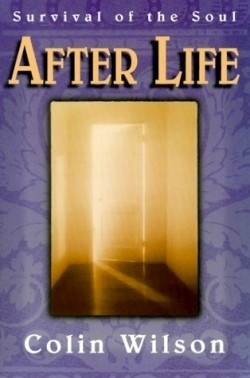
After Life
Survival of the Soul
“This book is not an attempt to convince anyone of the reality of life after death.
It is simply an attempt to present the facts in an orderly manner.
At the end, the reader should be in a position to make up his or her mind,”
says Wilson, a prolific author who has written on subjects as diverse as mysticism and criminology.
To enable the reader to do so, Wilson has presented a valuable group of case
studies giving evidence for the soul’s survival and touching on such topics as
reincarnation, near-death experiences and instances of communication between
the living and the dead. He traces such evidence through the history of
psychical research, current scientific interest and the musings of philosophers
to present a thoughtful analysis of a subject too long relegated to the
category of superstition.
Wilson, who resides with his wife in Cornwall, England, considers himself a
philosopher who is deeply concerned with the meaning of human existence. His
study of the possibility of the soul’s survival of death enriches what is known
of the human personality, showing it to be infinitely more complex than it is
generally credited to be.
The author suggests that every human being contains a whole “ladder” or
hierarchy of “selves” unified by a “basic self.” It is this “basic self” which
we recognize as a particular individual. A person grows and changes as the
various “selves” are accessed throughout the lifespan. The ability to access
“higher selves” may be what allows a person to manifest what we consider to be
psychic abilities, and the inability to maintain a strong enough “basic self”
may be what leads to the presentation of symptoms of multiple personality
disorder.
According to the author, what is generally considered to be of interest in
psychical research (including telepathy, astral projection, mediumship and
precognition of the future) are of little importance, since all of these are
latent powers able to be developed by any human being, and which regularly
manifest as spiritual development unfolds. What Wilson does consider important
has to do with the basic “Life Question” which he interprets not as “Who am I?”
but “What am I?,” a question which has been addressed by such philosophers as
Kierkegaard, Tolstoy, Dostoevsky, Nietszche and Camus. Moreover, psychical
research has been hampered by the fact that after verifying that a particular
phenomenon has occurred, it must look at the source of that phenomenon, and
there haven’t been tools developed yet for accessing that source in an
acceptably scientific manner.
Wilson presents a picture of the human soul that exceeds what most are able to
imagine, and offers the possibility that it is the ability to imagine that will
allow individuals to transcend the perceived limits of time and space.
According to the author, it is the power of the human imagination, properly
directed and controlled, that allows for escape in the present moment and for
it to achieve what the self-flagellating saint or the risk-taking adventurer
could only see dimly, that people are truly citizens of eternity.
Reviewed by
Kristine Morris
Disclosure: This article is not an endorsement, but a review. The publisher of this book provided free copies of the book to have their book reviewed by a professional reviewer. No fee was paid by the publisher for this review. Foreword Reviews only recommends books that we love. Foreword Magazine, Inc. is disclosing this in accordance with the Federal Trade Commission’s 16 CFR, Part 255.
